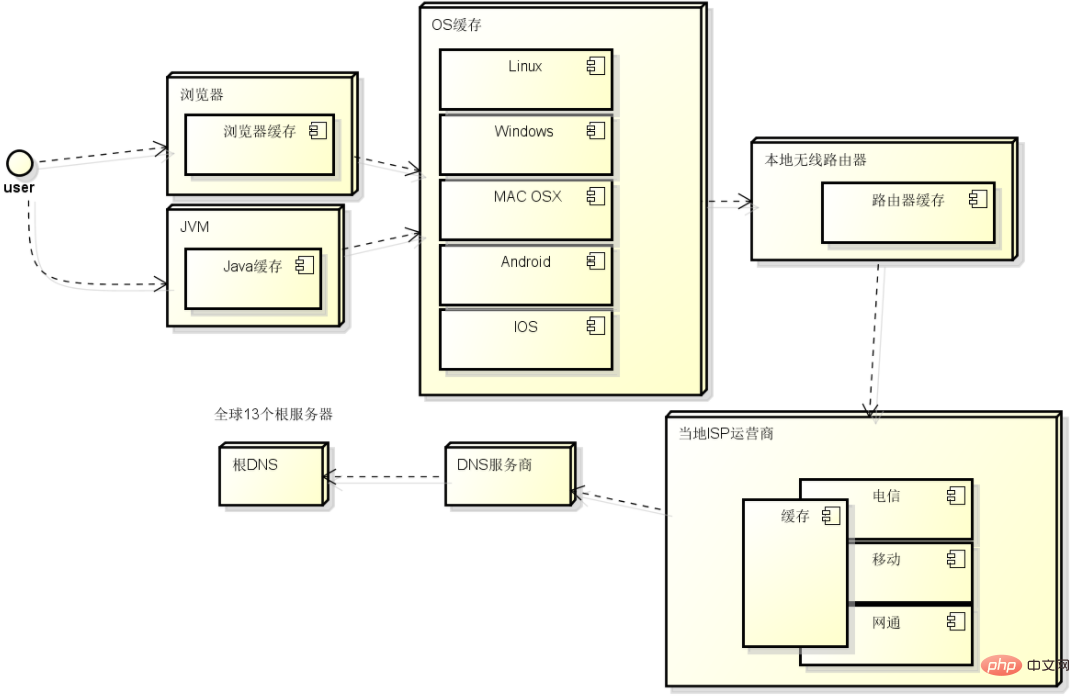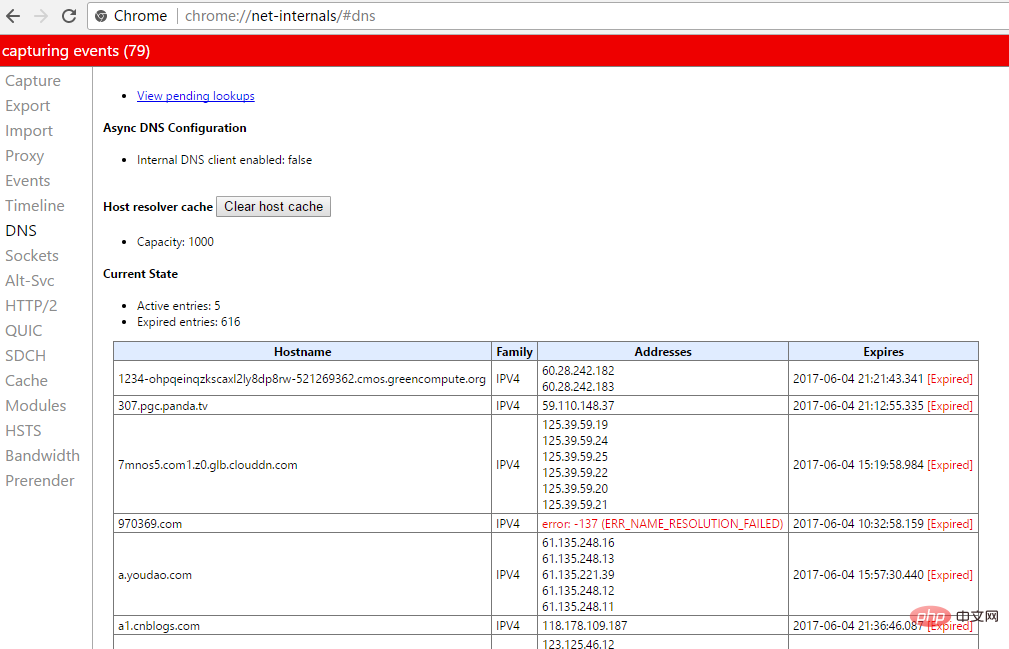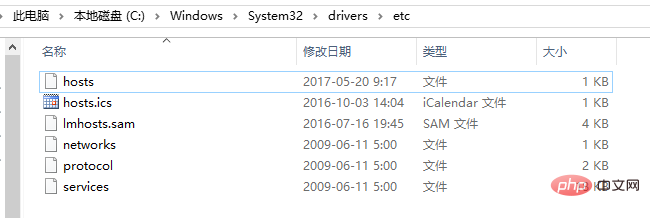Nodejs learning to understand the domain name resolution module DNS

This article will introduce the domain name resolution module DNS in detail. It has certain reference value. Friends in need can refer to it. I hope it will be helpful to everyone.
Related recommendations: "nodejs Tutorial"
Working Principle
Open the browser and go to The moment you enter the URL in the address bar above and press Enter, a lot of things happen. First of all, the computer only understands 0 and 1, which means that the computer does not understand human alphabetical addresses. It only understands IP addresses. If it is IPv4, it is four groups of 8-bit binary numbers. For human convenience, there needs to be a service that translates URLs into IP addresses, which is DNS
The entire DNS acquisition process is cached layer by layer

chrome://net-internals/#dns
 ## in the address bar 2. Search the operating system’s own DNS cache
## in the address bar 2. Search the operating system’s own DNS cache
3. Read the local HOST file. The path under Windows is generally
c:\Windows\System32\drivers\etc\hosts
 4. Initiate a DNS system call to the broadband operator ISP, and the ISP server will check its own cache
4. Initiate a DNS system call to the broadband operator ISP, and the ISP server will check its own cache
5. If it is not found yet, the ISP server will replace it The local computer initiates an iterative DNS resolution request
6. If it still fails, the resolution fails
Local resolution The dns module contains two types of functions, one of which is a function that uses underlying operating system tools to perform domain name resolution and does not require network communication. There is only one such function: dns.lookup()
[dns.lookup(hostname[, options], callback)】
This method resolves the domain name (such as 'cnblogs.com') The first record found is A (IPV4) or AAAA (IPV6). Parameter options can be an object or an integer. If no options are provided, both IP v4 and v6 addresses are acceptable. If options is an integer, it must be 4 or 6
The options parameter contains the following attributes
family:地址协议族,必须为4或6的整数 hints:设置getaddrinfo的标志,dns.ADDRCONFIG 或者 dns.V4MAPPED(ipv4映射成ipv6) all:false(默认),布尔值,如设置为true,则返回IP数组,否则返回单个IP地址
{
family: 4,
hints: dns.ADDRCONFIG | dns.V4MAPPED
}The callback function contains parameters (err, address, family). The address parameter represents an IP v4 or v6 address. The family parameter is 4 or 6, indicating the address family (not necessarily the value passed into lookup before). When an error occurs, the parameter err is the Error object, and err.code is the error code
[Note] err.code is equal to 'ENOENT', which may be because the domain name does not exist, or other reasons, such as no available files. Descriptor
var dns = require('dns');
dns.lookup('www.cnblogs.com', function(err, address, family){
console.log(err);//null
console.log(address);//218.11.2.249
console.log(family);//4});The same domain name may correspond to multiple different IPs. You can obtain it by setting options = {all: true}
var dns = require('dns');
dns.lookup('www.qq.com',{all:true}, function(err, address, family){
console.log(err);//null/*[ { address: '125.39.240.113', family: 4 },
{ address: '61.135.157.156', family: 4 } ] */
console.log(address);
console.log(family);//undefined});[dns.lookupService(address, port, callback)]
Corresponding to lookup, the lookupService() method performs the following steps from the IP address And reverse resolution from port to domain name
The parameters of the callback function of this method are (err, hostname, service). hostname and service are both strings (such as 'localhost' and 'http'). When an error occurs, the parameter err is the Error object, and err.code is the error code
var dns = require('dns');
dns.lookupService('127.0.0.1',80,function(err, hostname, service){
console.log(err);//null
console.log(hostname);//bai
console.log(service);//http});Network analysis Except for dns.lookup() All functions in the dns module need to connect to the actual DNS server for domain name resolution, and always use the network to perform DNS queries
[dns.resolve(hostname[, rrtype], callback)]
This method parses a domain name (such as 'cnblogs.com') into an array of rrtype specified record types
The valid rrtypes value is:
'A' (IPV4 地址, 默认)'AAAA' (IPV6 地址)'MX' (邮件交换记录)'TXT' (text 记录)'SRV' (SRV 记录)'PTR' (用来反向 IP 查找)'NS' (域名服务器 记录)'CNAME' (别名 记录)'SOA' (授权记录的初始值)
The callback parameter is
(err, addresses). The type of each item in addresses depends on the record type. When an error occurs, the parameter err is the Error object, and err.code is the error code <div class="code" style="position:relative; padding:0px; margin:0px;"><pre class='brush:php;toolbar:false;'>var dns = require(&#39;dns&#39;);
//IPV4
dns.resolve(&#39;www.qq.com&#39;,function(err,address){
console.log(address);//[ &#39;125.39.240.113&#39;, &#39;61.135.157.156&#39; ]
});
//IPV6
dns.resolve(&#39;www.qq.com&#39;,&#39;AAAA&#39;,function(err,address){
console.log(address);//[ &#39;240e:e1:8100:28::2:16&#39; ]
});
//别名
dns.resolve(&#39;www.qq.com&#39;,&#39;CNAME&#39;,function(err,address){
console.log(address);//undefined
});</pre><div class="contentsignin">Copy after login</div></div>[dns.resolve4(hostname, callback)]
Similar to dns.resolve(), only IPv4 (A record) can be queried
var dns = require('dns');
dns.resolve4('www.qq.com',function(err,address){
console.log(address);//[ '125.39.240.113', '61.135.157.156' ]
});【dns.reverse(ip, callback)】
This method is used for reverse To resolve the IP address, return the domain name array pointing to the IP address. Callback function parameters (err, hostnames). When an error occurs, the parameter err is the Error object, and err.code is the error code
var dns = require('dns');
dns.reverse('114.114.114.114',function(err,hostnames){
console.log(hostnames);//'public1.114dns.com'
});For more programming-related knowledge, please visit:
Programming TeachingThe above is the detailed content of Nodejs learning to understand the domain name resolution module DNS. For more information, please follow other related articles on the PHP Chinese website!

Hot AI Tools

Undresser.AI Undress
AI-powered app for creating realistic nude photos

AI Clothes Remover
Online AI tool for removing clothes from photos.

Undress AI Tool
Undress images for free

Clothoff.io
AI clothes remover

Video Face Swap
Swap faces in any video effortlessly with our completely free AI face swap tool!

Hot Article

Hot Tools

Notepad++7.3.1
Easy-to-use and free code editor

SublimeText3 Chinese version
Chinese version, very easy to use

Zend Studio 13.0.1
Powerful PHP integrated development environment

Dreamweaver CS6
Visual web development tools

SublimeText3 Mac version
God-level code editing software (SublimeText3)

Hot Topics
 Is nodejs a backend framework?
Apr 21, 2024 am 05:09 AM
Is nodejs a backend framework?
Apr 21, 2024 am 05:09 AM
Node.js can be used as a backend framework as it offers features such as high performance, scalability, cross-platform support, rich ecosystem, and ease of development.
 How to connect nodejs to mysql database
Apr 21, 2024 am 06:13 AM
How to connect nodejs to mysql database
Apr 21, 2024 am 06:13 AM
To connect to a MySQL database, you need to follow these steps: Install the mysql2 driver. Use mysql2.createConnection() to create a connection object that contains the host address, port, username, password, and database name. Use connection.query() to perform queries. Finally use connection.end() to end the connection.
 What are the global variables in nodejs
Apr 21, 2024 am 04:54 AM
What are the global variables in nodejs
Apr 21, 2024 am 04:54 AM
The following global variables exist in Node.js: Global object: global Core module: process, console, require Runtime environment variables: __dirname, __filename, __line, __column Constants: undefined, null, NaN, Infinity, -Infinity
 What is the difference between npm and npm.cmd files in the nodejs installation directory?
Apr 21, 2024 am 05:18 AM
What is the difference between npm and npm.cmd files in the nodejs installation directory?
Apr 21, 2024 am 05:18 AM
There are two npm-related files in the Node.js installation directory: npm and npm.cmd. The differences are as follows: different extensions: npm is an executable file, and npm.cmd is a command window shortcut. Windows users: npm.cmd can be used from the command prompt, npm can only be run from the command line. Compatibility: npm.cmd is specific to Windows systems, npm is available cross-platform. Usage recommendations: Windows users use npm.cmd, other operating systems use npm.
 Is there a big difference between nodejs and java?
Apr 21, 2024 am 06:12 AM
Is there a big difference between nodejs and java?
Apr 21, 2024 am 06:12 AM
The main differences between Node.js and Java are design and features: Event-driven vs. thread-driven: Node.js is event-driven and Java is thread-driven. Single-threaded vs. multi-threaded: Node.js uses a single-threaded event loop, and Java uses a multi-threaded architecture. Runtime environment: Node.js runs on the V8 JavaScript engine, while Java runs on the JVM. Syntax: Node.js uses JavaScript syntax, while Java uses Java syntax. Purpose: Node.js is suitable for I/O-intensive tasks, while Java is suitable for large enterprise applications.
 Is nodejs a back-end development language?
Apr 21, 2024 am 05:09 AM
Is nodejs a back-end development language?
Apr 21, 2024 am 05:09 AM
Yes, Node.js is a backend development language. It is used for back-end development, including handling server-side business logic, managing database connections, and providing APIs.
 Can nodejs write front-end?
Apr 21, 2024 am 05:00 AM
Can nodejs write front-end?
Apr 21, 2024 am 05:00 AM
Yes, Node.js can be used for front-end development, and key advantages include high performance, rich ecosystem, and cross-platform compatibility. Considerations to consider are learning curve, tool support, and small community size.
 Which one to choose between nodejs and java?
Apr 21, 2024 am 04:40 AM
Which one to choose between nodejs and java?
Apr 21, 2024 am 04:40 AM
Node.js and Java each have their pros and cons in web development, and the choice depends on project requirements. Node.js excels in real-time applications, rapid development, and microservices architecture, while Java excels in enterprise-grade support, performance, and security.






